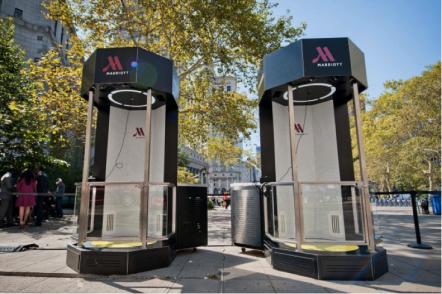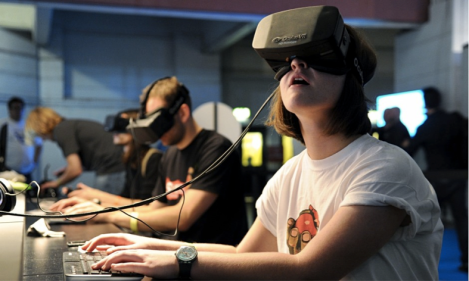Virtual Reality: Year 0
The origins of Virtual reality trace back to the 1950s, but VR technology has experienced significant advancements, drawing the attention the leaders in technology including Facebook, Microsoft, Samsung, HTC and even Apple has started to test the waters. Historically, when you said ‘Virtual Reality’ many people thought of science fiction, but so much has changed since Facebook’s $2 billion dollar acquisition of Oculus Rift – perhaps the most well-known VR headset, which at the time of the acquisition didn’t seem like much more than a successful Kickstarter campaign for a pair of glasses and a plastic box held together with masking tape. According to Neville Spiteri, CEO of WEVR, the number of head mounted displays (HMD) could triple by the end of the year as hardware companies release consumer versions such as Oculus Rift, Samsung GearVR and others.
Currently, much of the focus of VR is on entertainment and gaming; Facebook struck a deal with Lionsgate and 21st Century Fox to offer movies in what will be there attempt at a VR iTunes, the Oculus Store. Neftlix, Hulu, Twitch and others are all planning to offer streaming video services. Similarly, and perhaps the most advanced developments have been in the gaming world. Driven in part by the Unity Game Engine, companies like Kongregrate have been able to develop lifelike video games. While most of the current applications are consumer-focused, there is a significant market opportunity to address the commercial markets. Below are four industries beyond entertainment that will benefit substantially from the use of virtual reality in the years to come.
1. Real Estate
Virtual reality has many practical applications in real estate and will help provide technological advancements to an industry that has not benefited too much from innovation in recent years. Floored allows real estate developers to create simulations of properties to show potential clients before the development is constructed. This allows firms to increase occupancy rates earlier, having tenants bare some of the upfront development costs. Matterport, which recently closed a $30M round led by Qualcomm, has developed a relatively affordable ($4,500) 360-view camera that allows brokers and developers to film real estate property that they can then show potential clients using a virtual simulation. IrisVR has created software that allows architects to easily transform their 3D models into a virtual simulation that they can then show to prospective clients. Companies using VR will have a competitive advantage as they look to differentiate themselves through the eyes of their clients (that was a VR pun).
2. Healthcare
With the size and attractiveness of the market coupled with the desire for companies to apply innovation wherever possible, the healthcare industry should experience significant advancements driven by increased utilization of VR. For the past few decades, there’s been a growing interest in utilizing VR in clinical settings such as therapeutic treatments for PTSD, phobias and even severe pain in burn victims. Imagine instead of having a patient lying on a couch as a therapist verbally walks them through a scenario, the patient can put on a VR headset and operate within a predetermined and relevant simulation. Companies like Virtually Better are creating content that allows therapists to provide a safe and controlled environment to more interactively treat their patients. Using VR for medical education and training is another application that could greatly reduce costs and increase outcomes. For example, according to an article in Fortune, 65,000 elderly care facilities in America spend on average $3,000 per employee to learn tracheal insertion procedures. Next Galaxy is developing a VR simulation that would eliminate the need to travel to specialized training facilities, reducing the cost to only $40 per employee.

3. Travel and Leisure
Companies such as Marriott are using VR to create virtual simulations for guests, allowing users to step into Marriott locations around the world from one of their VR phone booths. Marriott has been testing many new and innovative concepts to keep up with the ‘modern travelers’ needs.’ Similarly, companies like YouVisit are producing virtual travel experiences, working with large travel agencies to promote what they call “try it before you buy it,” allowing travelers to experience a service or destination before the purchase a vacation package. Landmark Entertainment is in the process of creating VR Theme Parks across China as well as a virtual world’s fair. While the applications related to travel are still early, the opportunity seems to exist and perhaps in the future, virtual travel will be a popular alternative to jetsetting.

4. Education
Growing up, I didn’t have iPads or technologies beyond a VCR and the original Mac in the classroom, but future generations will benefit substantially from new technologies including VR. The use of technology in schools has become quite mainstream and we can expect this trend to continue as new offerings become available – enter VR educational simulations. Imagine you get to experience the signing of the declaration of independence instead of simply reading about it in your textbook. Or imagine you can travel to ancient Egypt and experience the culture and political ecosystems instead of watching a PBS special. SunriseVR has begun developing educational content for the classroom including a field trip to space and a simulation to help students understand the human body on a cellular level. SpaceVR is planning to launch a camera rig into space aboard a resupply mission in December, offering paying subscribers a chance to view space through a VR headset. I was at a hackathon where a team was working on taking video footage of a class and converting it to a VR simulation. With the recent interest in massive open online courses (MOOCs) such as edX and Coursera, which create accessibility to education that was never before possible, these sites will now be able to offer interactive content in VR. The applications in education are seemingly endless.

Many of these commercial applications exist but the necessary hardware and relevant content have not been made readily available. With the technology evolving so rapidly and becoming more immersive everyday, expect to see more and more companies establish internal VR strategies and many new companies begin to offer VR products with commercial applications.
If you’re interested in VR, shoot me an email (dennis.lally@sloan.mit.edu) and follow me on twitter (@denchenzo)!

